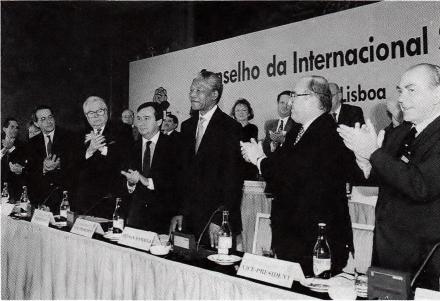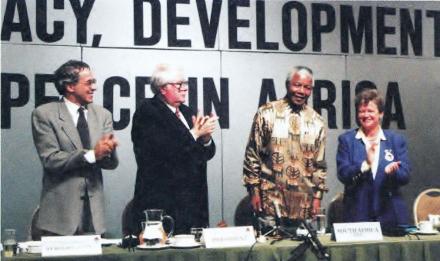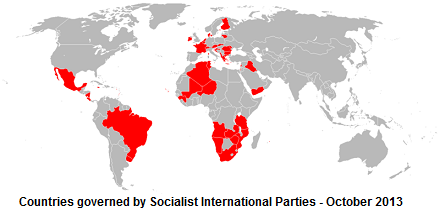From the Open-Publishing Calendar
From the Open-Publishing Newswire
Indybay Feature
International
South Bay
Global Justice & Anti-Capitalism
Government & Elections
Labor & Workers
Racial Justice
Socialist International honours the life and legacy of Nelson Mandela
The Socialist International is deeply moved by the passing of Nelson Mandela, the man who, representing the struggle for freedom of an entire nation, became a symbol for justice, reconciliation and peace for the entire world.

Nelson Mandela’s life touched countless people across the globe. His determination to put an end to racism and apartheid and his humanity in dealing with the horrors of the past and in creating the basis for a common future for all in South Africa set the stage for a new global society for the twenty first century - the only one possible, of inclusion, tolerance, respect, peace, democracy, freedoms and rights. That is his foremost legacy, and today our entire movement pays respect to a unique man, a man in whom our vision of a better world, a society of opportunities for all and of real solidarity between people and nations, found its best exponent.
Mandela was born to the Thembu people of the Eastern Cape of South Africa in 1918. Throughout his life many fondly referred to him by his Thembu clan name, Madiba. In 1943 Mandela joined Witwatersrand University to study law, then a predominately white institution where he came up against racism. Becoming active in the ANC and co-founding the ANC Youth League, Mandela rose in the movement against racial discrimination and against the apartheid policy implemented in 1948 by South Africa’s white minority government, under the leadership of the National Party. He led crucial rallies and demonstrations with the ANC and after their Defiance Campaign in the early 1950s the United Nations formally incorporated apartheid among the issues to be tackled by the organisation. Mandela became central to the work of the African National Congress, strengthening the party’s underground networks to ensure it withstood the government ban imposed on it in 1960. He was charged several times during the movement’s protests and in 1964 he was sentenced to life imprisonment for high treason.
Throughout Mandela’s incarcerated years, the Socialist International and its member parties were actively engaged against apartheid, drawing international attention to the campaign for the release of Mandela and the other political prisoners, and in support of the African National Congress.
Mandela was extraordinarily selfless in his commitment to put an end to apartheid, turning down offers of conditional release by the South African government that involved the abandonment of his political work. His convictions and strength were such that he endured 27 years of prison until he was released unconditionally in 1990 under South African President FW de Klerk who legalised all the political parties that had been banned. In 1993, Mandela’s role was acknowledged when he was awarded the Nobel Peace Prize, along with de Klerk, for the ‘peaceful termination of the apartheid regime, and for laying the foundations for a new democratic South Africa’.
After his release, Nelson Mandela participated in various activities of the Socialist International during the early 1990s, including the SI Council meeting held in Lisbon, Portugal, on 5-6 October 1993, and the SI Council organised with the ANC in Cape Town, South Africa, on 10-11 July, 1995.
In his memorable speech at the SI Council in Lisbon, Mandela called for an official SI observation mission to South Africa to ensure that the 1994 elections, the country’s first in which his party would run, would be ‘free and fair’. Highlighting the historical significance of the vote, he said ‘Some 19 million people who will make up 91 per cent of the electorate will be voting for the very first time’ and that the elections would finally achieve for South Africa a government democratically chosen by the people. The International was proud to carry out this mission, and celebrated Mandela’s overwhelming victory in these elections, becoming not only the country’s first black president after over three centuries of white rule but the country’s first president to be democratically elected.
Mandela’s domestic achievements as President and his commitment to national reconciliation and to ensuring that the new democracy reflected respect and equality for all people, regardless of race or colour, was an example to the world. The new South African Constitution was agreed by parliament in May 1996. In his efforts to achieve a strong and resilient democracy, Nelson Mandela also paid particular attention to foreign policy, focusing on contributing to more fair international relations and greater dynamism for the South African economy.
Mandela was warmly welcomed at the SI Council meeting in Cape Town, its first ever meeting in South Africa, and his speech received a standing ovation: ‘We in South Africa have been very fortunate in that our struggle, and as difficult as it was, enjoyed the support of democrats throughout the world… In prison, those thick walls could not prevent the ideas which challenged the cruel system of racial oppression under which we were living. And the Socialist International was in the forefront of that struggle.’
After retiring as President, Mandela continued to promote and cultivate democracy and freedoms in Africa and for nations and people across the world. He voiced his opinion in international politics, raised awareness of HIV/AIDS, and launched the Mandela Foundation in 1999 and The Elders group in 2007.
The International has been inspired by Mandela’s life, and has been honoured to work with him on a journey that has given so much hope to other democratic struggles in the world. His dignity, character and indomitable spirit will never be forgotten.
We stand today with his family, his people and his comrades of the African National Congress, ANC, who hosted our global movement last year for the XXIV SI Congress, in mourning the loss and celebrating the life of Madiba, Nelson Rolihlahla Mandela.
http://www.socialistinternational.org/
Mandela was born to the Thembu people of the Eastern Cape of South Africa in 1918. Throughout his life many fondly referred to him by his Thembu clan name, Madiba. In 1943 Mandela joined Witwatersrand University to study law, then a predominately white institution where he came up against racism. Becoming active in the ANC and co-founding the ANC Youth League, Mandela rose in the movement against racial discrimination and against the apartheid policy implemented in 1948 by South Africa’s white minority government, under the leadership of the National Party. He led crucial rallies and demonstrations with the ANC and after their Defiance Campaign in the early 1950s the United Nations formally incorporated apartheid among the issues to be tackled by the organisation. Mandela became central to the work of the African National Congress, strengthening the party’s underground networks to ensure it withstood the government ban imposed on it in 1960. He was charged several times during the movement’s protests and in 1964 he was sentenced to life imprisonment for high treason.
Throughout Mandela’s incarcerated years, the Socialist International and its member parties were actively engaged against apartheid, drawing international attention to the campaign for the release of Mandela and the other political prisoners, and in support of the African National Congress.
Mandela was extraordinarily selfless in his commitment to put an end to apartheid, turning down offers of conditional release by the South African government that involved the abandonment of his political work. His convictions and strength were such that he endured 27 years of prison until he was released unconditionally in 1990 under South African President FW de Klerk who legalised all the political parties that had been banned. In 1993, Mandela’s role was acknowledged when he was awarded the Nobel Peace Prize, along with de Klerk, for the ‘peaceful termination of the apartheid regime, and for laying the foundations for a new democratic South Africa’.
After his release, Nelson Mandela participated in various activities of the Socialist International during the early 1990s, including the SI Council meeting held in Lisbon, Portugal, on 5-6 October 1993, and the SI Council organised with the ANC in Cape Town, South Africa, on 10-11 July, 1995.
In his memorable speech at the SI Council in Lisbon, Mandela called for an official SI observation mission to South Africa to ensure that the 1994 elections, the country’s first in which his party would run, would be ‘free and fair’. Highlighting the historical significance of the vote, he said ‘Some 19 million people who will make up 91 per cent of the electorate will be voting for the very first time’ and that the elections would finally achieve for South Africa a government democratically chosen by the people. The International was proud to carry out this mission, and celebrated Mandela’s overwhelming victory in these elections, becoming not only the country’s first black president after over three centuries of white rule but the country’s first president to be democratically elected.
Mandela’s domestic achievements as President and his commitment to national reconciliation and to ensuring that the new democracy reflected respect and equality for all people, regardless of race or colour, was an example to the world. The new South African Constitution was agreed by parliament in May 1996. In his efforts to achieve a strong and resilient democracy, Nelson Mandela also paid particular attention to foreign policy, focusing on contributing to more fair international relations and greater dynamism for the South African economy.
Mandela was warmly welcomed at the SI Council meeting in Cape Town, its first ever meeting in South Africa, and his speech received a standing ovation: ‘We in South Africa have been very fortunate in that our struggle, and as difficult as it was, enjoyed the support of democrats throughout the world… In prison, those thick walls could not prevent the ideas which challenged the cruel system of racial oppression under which we were living. And the Socialist International was in the forefront of that struggle.’
After retiring as President, Mandela continued to promote and cultivate democracy and freedoms in Africa and for nations and people across the world. He voiced his opinion in international politics, raised awareness of HIV/AIDS, and launched the Mandela Foundation in 1999 and The Elders group in 2007.
The International has been inspired by Mandela’s life, and has been honoured to work with him on a journey that has given so much hope to other democratic struggles in the world. His dignity, character and indomitable spirit will never be forgotten.
We stand today with his family, his people and his comrades of the African National Congress, ANC, who hosted our global movement last year for the XXIV SI Congress, in mourning the loss and celebrating the life of Madiba, Nelson Rolihlahla Mandela.
http://www.socialistinternational.org/


Add Your Comments
Latest Comments
Listed below are the latest comments about this post.
These comments are submitted anonymously by website visitors.
TITLE
AUTHOR
DATE
The Socialist International also brought you . . .
Tue, Jan 28, 2014 7:16PM
Democracy + Social Welfare = Humane Society
Mon, Dec 23, 2013 4:36AM
From the same lovely guys who brought us World War One, the murder of Rosa Luxemburg...
Thu, Dec 19, 2013 11:12PM
We are 100% volunteer and depend on your participation to sustain our efforts!
Get Involved
If you'd like to help with maintaining or developing the website, contact us.
Publish
Publish your stories and upcoming events on Indybay.
Topics
More
Search Indybay's Archives
Advanced Search
►
▼
IMC Network


